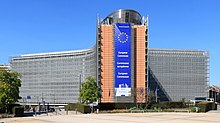Legitimacy and criticism

As the commission is the executive branch, candidates are chosen individually by the 27 national governments. Within the EU, the legitimacy of the commission is mainly drawn from the vote of approval that is required from the European Parliament, along with its power to dismiss the body. Eurosceptics have therefore raised the concern of the relatively low turnout (often less than 50%) in elections for the European Parliament since 1999. While that figure may be higher than that of some national elections, including the off-year elections of the United States Congress, the fact that there are no direct elections for the position of commission president calls the position's legitimacy into question in the eyes of some Eurosceptics. The fact that the commission can directly decide (albeit with oversight from specially formed 'comitology committees') on the shape and character of implementing legislation further raises concerns about democratic legitimacy.
Even though democratic structures and methods are changing there is not such a mirror in creating a European civil society. The Treaty of Lisbon may go some way to resolving the perceived deficit in creating greater democratic controls on the Commission, including enshrining the procedure of linking elections to the selection of the Commission president. Historically, the commission had indeed been seen as a technocratic expert body which, akin with institutions such as independent central banks, deals with technical areas of policy and therefore ought to be removed from party politics. From this viewpoint, electoral pressures would undermine the Commission's role as an independent regulator. Defenders of the Commission point out that legislation must be approved by the Council in all areas (the ministers of member states) and the European Parliament in most areas before it can be adopted, thus the amount of legislation which is adopted in any one country without the approval of its government is limited.
In 2009 the European ombudsman published statistics of citizens' complaints against EU institutions, with most of them filed against the Commission (66%) and concerning lack of transparency (36%). In 2010 the Commission was sued for blocking access to documents on EU biofuel policy. This happened after media accused the Commission of blocking scientific evidence against biofuel subsidies. Lack of transparency, unclear lobbyist relations, conflicts of interests and excessive spending of the Commission was highlighted in a number of reports by internal and independent auditing organisations. It has also been criticised on IT-related issues, particularly with regard to Microsoft.
Comments
Post a Comment